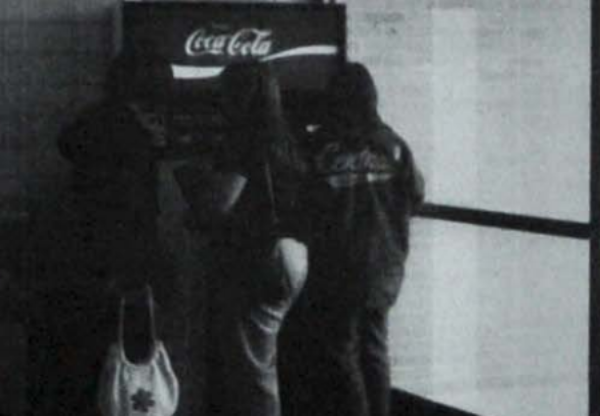Looking Back: Central’s 1978 School Years Sees Introduction of High-Esteemed Coca-Cola Machines

Preservation of Chattanooga Central History
LOOKING BACK: CENTRAL’S 1978 SCHOOL YEAR SEES INTRODUCTION OF HIGH-ESTEEMED COCA-COLA MACHINES — Students crowd around one of the new Coke machines during one of their breaks.
February 24, 2020
Coke Machines, Lunch Program Among Changes for Students
September 1977
The start of the 1977-1978 school year saw the start of something great: Coke machines. Three of them were placed in the commons, while two of them resided in the armory. These Coke machines were all the rave when they first arrived (and arguably still are). However, the vending machines were not as accessible as they are now. When they were first installed, the machines were only turned on during 10-minute breaks, one in the morning and one in the afternoon. This is much more restrictive compared to today’s machines, where they are only shut off during the lunch periods. These short and few opportunities for using the machines brought a little turmoil from the student body, but students were thankful, nonetheless. The beginning of this school year also brought in the birth of many other changes that have stuck with the school over the years. These include changes in the school lunch program, required parking passes, and new freshman-specific classes.
Science Class to Work On Beautification of School Grounds
November 1977
A school’s outside appearance can be as important as its education function inside of that exterior. A pleasing-to-the-eye layout of school grounds creates a more welcoming environment and raises the school’s esteem in the eyes of onlookers. In 1977, Mr. Wilkie Green and his applied science students worked hard to improve Central’s outer appearance. Green and his students’ project was funded by Central’s Beautification Fund, which was founded during Central’s first year at its Highway 58 location. The fund covered the cost of all supplies, tools, and materials needed for the beautification. Green started the project at the beginning of the school year and carried it on until May. Principal Stan Farmer shared the reason why this initiative went into place. Farmer explained that the Department of Education does not provide funds for improve school grounds and that Central never had enough money to pay for professional landscaping, even with the Beautification Fund. He felt that the best alternative was to assign the fund to Green so that he and his applied science students could carry out the necessary improvements.
Permits Required For Cars
December 1977
Each new school year brings in new policies. This school year introduced a requirement for a parking permit for students who drive themselves to school. Central’s main motive for the introduction of permits was to better identify student drivers and their vehicles. Many instances brought in this needed change. These include a car fire in January 1977, in which the owner could not be quickly identified, situations where students need to move their car, where the administration does not know the owner, identifying reckless drivers on school campus and dealing with them accordingly, and ensuring that student drivers have valid drivers’ licenses. The passes started at a price of 50 cents, with all profit going into a special fund for the parking lot. Many improvements were in consideration at this time, including new parking space markers, speed bumps, and a trash removal device. Even though the school’s motives for the permits were to improve safety and quality of this certain area of the school, students did not react well to the introduction of the permits.
Farmer Announces Retirement
March 1978
This certain school year was filled with many introductions, but it also included a bittersweet goodbye. Principal Stanley Farmer, a prominent figure in Central history, announced that he would retire at the end of the school year. Farmer first entered Central’s faculty in 1945, where he was the head coach of the football team. Farmer went above and beyond with the team; most of his past players and students continued to hold him in high respect, even years after graduation. Farmer was appointed assistant principal in 1970, behind Dr. Hobart Millsaps. After Millsaps’s retirement in 1977, Farmer became the principal of Central High School. He had a love for the school that was unmatched, and it showed through his actions. Students and teachers hated to see him retire, but they knew it was for the best. Farmer may have left Central, but his presence never left the halls.
Digest Receives Top Honors
April 1978
The Central Digest has been around for many decades, whether that includes the physical copies of the past or the online forum of the now. Regardless of the platform, Central’s history has been lined with outstanding writers. The Central Digest class of 1978 received recognition for their craft, as they won several awards from the Tennessee High School Press Association. The Digest received an All-Tennessee rating, the highest award given by the Tennessee High School Press Association. Seven other schools were awarded the rating out of a total of 84 schools. Gerry McCutchinson and Diana Spencer received first place awards in individual writing. Tonya Steele, Desiree Daniels, and Bill Gibson received second place awards; Steele was awarded due to a news story on abortion, Daniels won for her sports articles on heating pads for players, and Gibson won for an editorial on the elimination of semester exams. Third place awards were won by David Little and Tommy Cofer for their respective editorials. Overall, the awards were a great showcase of Central’s exceptional talent in the field of writing and the excellent staff of the Central Digest.
Many aspects of Central High School’s history, including past physical copies of the Central Digest can be found at the Preservation of Chattanooga Central website.




